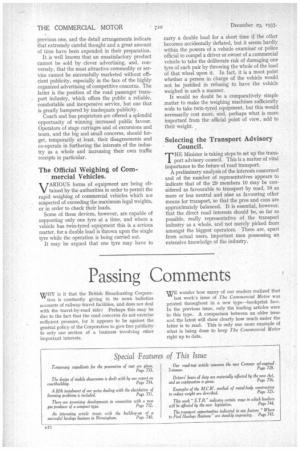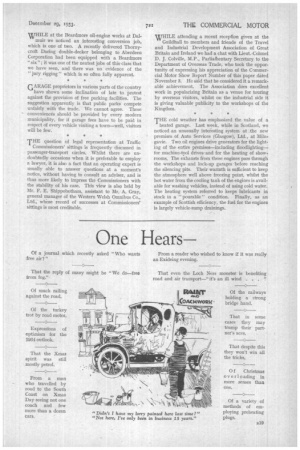Passing Comments
Page 28

Page 29

If you've noticed an error in this article please click here to report it so we can fix it.
WHY is it that the British Broadcasting Corpora tion is constantly giving in its news bulletins accounts of railway-travel facilities, and does not deal with the travel-by-road side? Perhaps this may be due to the fact that the road concerns do not exercise sufficient pressure, for it appears to be against the general policy of the Corporation to give free publicity to only one section of a business involving other important interests.
WE wonder how many of our readers realized that last week's issue of The Commercial Motor was printed throughout in a new type—bookprint face. In the previous issue, only the leading articles were in this type. A comparison between an older issue and the latest will show clearly how much easier the latter is to read. This is only one more example of what is being done to keep The Commercial Motor right up to date.
WHILE at the Beardmore oil-engine works at Dal" muir we noticed an interesting conversion job, which is one of two. A recently delivered Thornycroft Daring double-decker belonging to Aberdeen Corporation had been equipped with a Beardmore " six " ; it was one of the neatest jobs of this class that we have seen, and there was no evidence of the 'jury rigging " which is so often fully apparent.
GARAGE proprietors in various parts of the country
have shown sonic inclination of late to protest against the provision of free parking facilities. The suggestion apparently is that public parks compete unfairly with the trade. We cannot agree. These conveniences should be provided by every modern municipality, for if garage fees have to be paid in respect of every vehicle visiting a town—well, visitors will be few.
THE question of legal representation at Traffic Commissioners' sittings is frequently discussed in passenger-transport circles. Whilst there are undoubtedly occasions when it is preferable to employ a lawyer, it is also a fact that an operating expert is usually able to answer questions at a moment's notice, without having to consult an adviser, and is thus more likely to impress the Commissioners with the stability of his case. This view is also held by Mr. F. E. Shippobotham, assistant to Mr. A. Gray, general manager of the Western Welsh Omnibus Co., Ltd., whOse record of successes at Commissioners' sittings is most creditable.
WHILE attending a recent reception given at the
Guildhall to members and friends of the Travel and Industrial Development Association of Great Britain and Ireland we had a chat with Lieut.-Colonel D. J. Colville, M.P., Parliafnentary Secretary to the Department of Overseas Trade, who took the opportunity of expressing his appreciation of the Commercial Motor Show Report Number of this paper dated November 3. He said that he considered it a remarkable achievement. The Association does excellent work in popularizing Britain as a venue for touring by overseas visitors, whilst on the industrial side it is giving valuable publicity to the workshops of the Kingdom.
THE cold weather has emphasized the value of a
heated garage. Last week, while in Scotland, we noticed an unusually interesting system at .the new premises of Auto Services (Glasgow), Ltd., at Milngavie. Two oil engines drive generators for the lighting of the entire premises—including floodlighting— for machine-tool drives,and for the heating of showrooms. The exhausts from these engines pass through the workshops and lock-up garages before reaching the silencing pits. Their warmth is sufficient to keep the atmosphere well above freezing point, whilst the hot water from the cooling tank of the engines is available for washing vehicles, instead of using cold water. The heating system referred to keeps lubricants in stock in a " pourable " condition. Finally, as an example of Scottish efficiency, the fuel for the engines is largely vehicle-sump drainings.




















































































